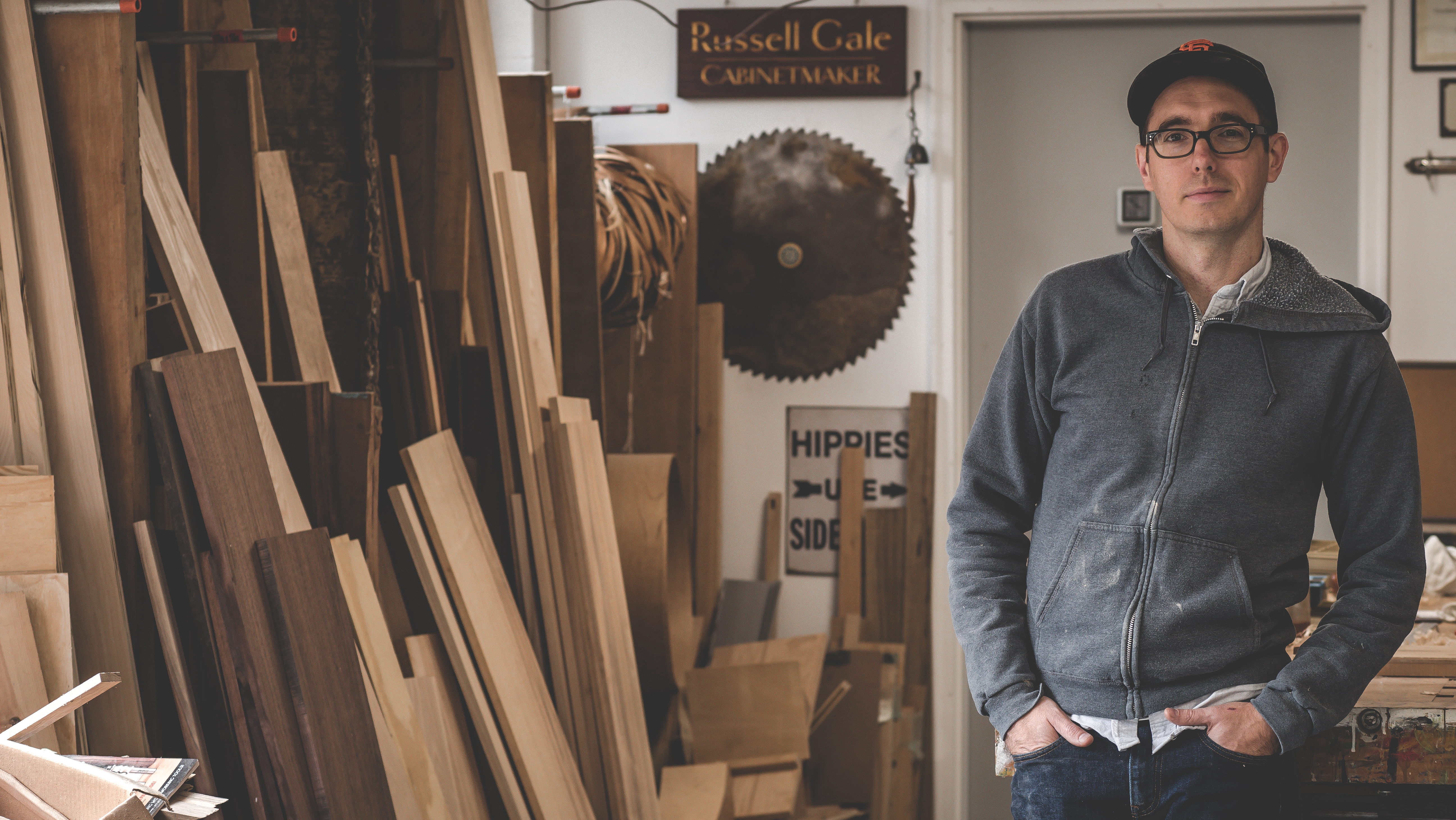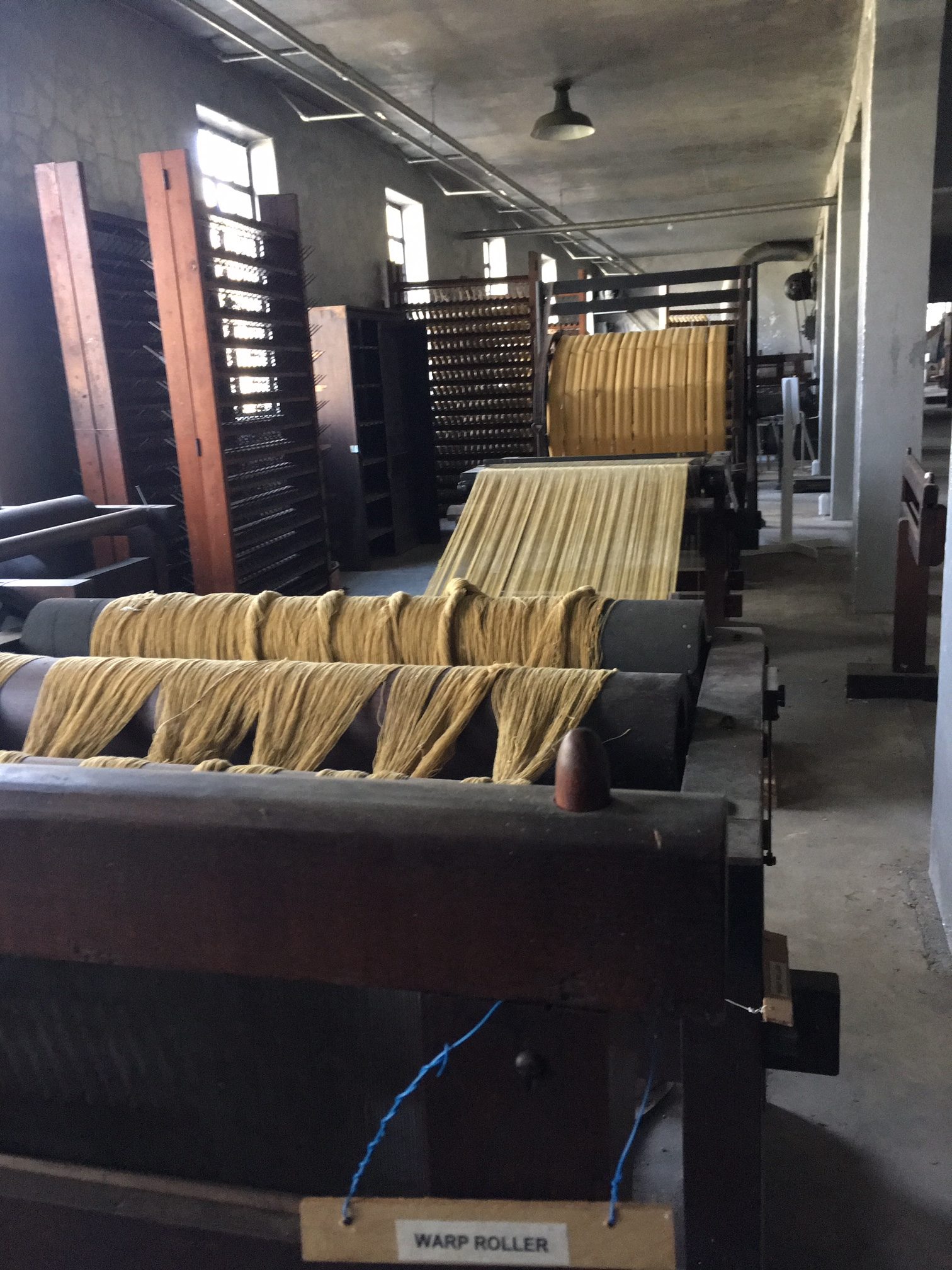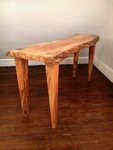We may receive a commission when you use our affiliate links. However, this does not impact our recommendations.

Russell in his shop. (Photo: Justin Gartman)
As part of my occasional series about different varieties of furniture makers, I interviewed Russell Gale, whom I met in February when I exhibited work in the Grove Park Inn Arts and Crafts Conference in Asheville, North Carolina.
Russell, 34, is an accomplished furniture maker who did undergraduate training in construction management and furniture making while at Appalachian State University, then spent two years in the furniture making program at the College of the Redwoods (now the Krenov School) from 2007 to 2009. (See my post about his clock here.) After this training, Russell worked with several woodworkers before he set up and ran his own shop at Grovewood, a property adjoining the Grove Park Inn. Today Russell is general manager of Biltmore Industries, a position he worked up to after starting as director of the furniture department of the Grovewood Gallery, a 9000-square-foot American craft gallery that represents more than 400 artists in a variety of media, from studio furniture to ceramics, jewelry, and glass, as well as having an outdoor sculpture garden. What was it like, I wondered, to shift from living the dream of running his own furniture business to working in a professional capacity for an institution?
Russell has spent a lot of time thinking about this. “It’s been a transition,” he says. “When I took the furniture director’s position in 2017, I was working in my shop. They asked if I knew someone who would be interested in managing the furniture gallery. The shop was finally making money. But it felt like this opportunity I couldn’t afford to turn down out of hand, especially in a town like Asheville–you have a lot of makers; they’re all educated. I said to my wife, Jeni, ‘This could be really cool.’
“I called Clark Kellogg, with whom I had been a student at the College of the Redwoods. Having wanted to set up a shop for so long, and it was finally working—I had all the equipment I needed and I was getting orders, and they were good orders—I was excited about this different opportunity, but I felt a challenge to my identity. It felt like I was dropping out of the race. A lot of my identity was wrapped up in being able to say ‘furniture making is what I do for a living.’ And it doesn’t help that when you tell people you now do this other job, they almost make you feel bad: ‘Oh, what a shame, you gave up the dream,’ because they have this idea that it’s this idyllic profession where you’re working quietly in your shop, because their grandfather did it. It took a while before I was comfortable saying ‘I’m not a furniture maker any more, if you’re asking what I’m doing for a living.’ Now I would say ‘I manage a historic property and a large part of that is overseeing an American craft gallery.’ But if the sense of pride came from being able to say I’m a self-employed woodworker, that’s a departure.”
When Russell first heard about the opportunity to work for the Grovewood Gallery, he and Jeni had just bought a house. “A regular income was definitely a draw,” he says, as was the prospect of having health insurance and paid time off, benefits he’d never had working in construction or furniture shops. Another plus would be remaining in a place where he had worked for a while, a place he knew and loved.
“I don’t know if I would have taken the job if my shop had not been right next door,” he says. “I think I needed to be able to tell myself that I would easily be able to get in the shop—before work, after work. It was a leap, but a controlled leap,” because his shop was only 30 yards from where he would be working.

Jeni and Russell with Fuller.
Today Russell and Jeni have a 16-month-old son, Fuller. He has set up a shop in the 500-square-foot garage at home; nights and weekends are shop time. Although he maintains his website, he takes on few orders, other than making panels and custom frames for a painter friend as a source of extra income.
“Sometimes when I was running my shop, the orders I wanted to come in weren’t coming in,” he continues. “It wasn’t work I was excited about, or I wasn’t feeling as fast as I wanted to be. But when it’s this dream, you keep trying to stick it out. At some point around 2015 I read something about ‘I love what I do.’ A person in the article said, ‘I love it because I’m good at it.’ For me, a light went off: So often we want to do something because we love it. But that doesn’t mean we’re really good at it. As humans, when we find something we feel good at, it fulfills something in us and allows us to grow and reach levels we wouldn’t otherwise reach.
“I love craft. This gallery and property management job is not, for me, a huge leap from what I was doing before. It’s an easy thing to put your name on, showing the public how important handmade work is. But that was a big realization for me: ‘I love it because I’m good at it.’ I looked around at people I knew who always seemed to be trying to go upstream. Good on you; it’s important to your identity that you see this through. But personally, I’m glad I took that leap, and I’m glad that my friends whose opinions mean a lot to me didn’t say ’Ooh, you’re giving up the dream.’ Clark said, ‘Man, that sounds really cool.’
“It’s hard to have spent all this time pulling together a shop to then depart on another path. But finding something you’re good at might exceed your expectations and might give you a strong sense of fulfillment. That has allowed me to make peace with my job. Again, I love what I do. It’s also helpful that my job is so hands-on. I don’t believe that I could sit behind a desk all day, even if I was good at it! I love being hands-on.”
As Russell showed me around the gallery, then took me on a private tour of the Biltmore Industries Museum, Car Museum, and weaving operation, his aptitude as a docent was clear. He struck me as a natural people-person. The contact with others in his current job is an element he appreciates. “Working alone all the time in my shop, I enjoyed it,” he says. “But I also enjoy talking to people. My bench at the College of the Redwoods was the first one by the door. Being in that location means frequent interruptions by prospective students touring the school. Those were people trying to decide if they wanted to attend the school. ‘I’m within my rights to ignore them,’ I remember thinking, ‘but they’re trying to decide…they’re thinking about doing the exact thing I’m doing, so the right thing to do is be an ambassador.’ And I actually enjoy that.”

View from a corner of the vast weaving room at Biltmore Industries.
“I now get a strong sense of satisfaction and fulfillment from these other hats I’m wearing (hopefully with success) …. husband, father, manager, etc. Right now, if Fuller’s awake, I’m with him and Jeni. Which gives woodworking even less time. I don’t have even one regret about that. I look at my shop and say ‘It’ll be there later.’
“There’s a danger in turning your avocation into a vocation. You’ve got to be sure you’re willing to accept the risks of running your own business. Running your own shop is not the same experience as being at College of the Redwoods. The realities, the stresses… It’s different. I’ve since picked up new hobbies. I love to cook and I love to garden and I love being with my wife and son. But if woodworking is all you’ve got that you really love doing, you’ve got a lot to lose if you get burned out.
“I really am so satisfied with where I am right now. All that being said, it still is humbling and flattering to hear such complimentary things about my work …. THAT type of work.” [Russell was referring to my response to his clock in the gallery.] “It’s still such an important part of my identity and it’s in moments like this that I become acutely aware of that.
“Ironically, I also have considered that, even though my profession is not furniture making right now, I wouldn’t have the position I have today had I not been sanding in THAT woodshop next door when the original opportunity presented itself. Despite the fact that today I spend less time with the furniture here than when I started, it was my background in furniture making that got me that interview. I’ve found the best thing you can do is remain open as you make your way in the world. You might not end up where you planned but you might be surprised how happy you are with where you land.”
To which I will add just one thing: Russell, you are also seriously good at designing and making furniture.
Here are some supplies and tools we find essential in our everyday work around the shop. We may receive a commission from sales referred by our links; however, we have carefully selected these products for their usefulness and quality.









